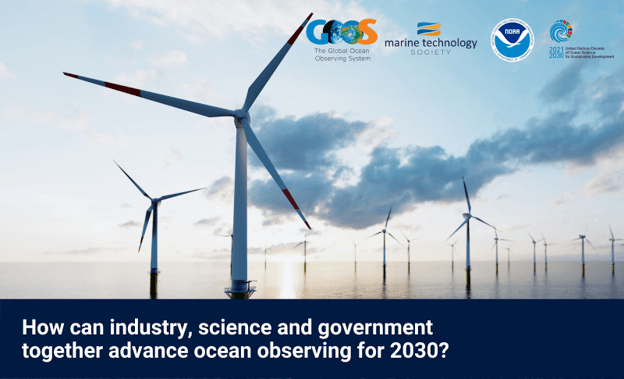
We are delighted to announce the start of Dialogues with Industry – a forum for compact and meaningful dialogue with new and established companies, academia and government. The dialogue series aims to highlight opportunities for the public and private sectors to work in partnership towards achieving a mature, vibrant ocean observing enterprise that will help accelerate the development of a thriving blue economy.
The ocean is an integral part of the economies of many nations, providing food security and livelihoods for billions of people. However, the full potential of the ocean economy – or the blue economy – is yet to be unleashed, and to do that it is essential to understand the physical, chemical and biological processes that drive ocean productivity and signal ocean changes. Sustained ocean observations are key to this understanding, but our current observing system is still in critical need of expansion.
The value of ocean information is becoming widely recognized, and the United Nations Decade of Ocean Science for Sustainable Development (‘the Ocean Decade’) acknowledges the need for an expanded Global Ocean Observing System as one of its 10 major challenges. However, currently, most funding for ocean observations comes from ocean science research budgets at national, regional or local levels.
If we are to meet the innovation challenges of observing and delivering an expanded level of ocean information, reliance on science budgets will not be sufficient. We need partnerships and expertise from the private sector along each step of the ocean information value chain: from sensors, platforms, and other observing technologies, encompassing field operations and the taking of observations, as well as those developing and delivering ocean information services to users. Cooperation between the public and private sector can evolve a thriving ocean observing enterprise and blue economy, benefiting business, government and society.
Learn more about the market drivers and opportunities across all parts of the ocean information value chain in our Background paper.
To start the discussion about meeting these challenges, Dialogues with Industry will bring together the public and private sectors during 4 dialogues – in the form of facilitated discussions – which will cover topics such as instrument provision, multi-sectoral ocean architecture, user driven ocean information services and new technology for the Ocean Decade. The Dialogues will result in actionable recommendations on how the commercial, government, and scientific sectors can deploy the next generation Global Ocean Observing System to meet the needs of the blue economy.
“To meet societal needs in this crucial Ocean Decade, we need an active and vibrant dialogue between industry, academia and government” says Emma Heslop, the Acting Office Director of GOOS. “Our Dialogues will support industry participation in the ocean observing enterprise and seek to find ways for working together to solve our common problems faster.”
The first online session of Dialogues with Industry will take place on 14 of September, 2022, and will be followed by the remaining three sessions every month. We invite interested individuals to register to the dialogues of their choice and add their voice to the conversation!
Dialogue 1: 14 September, 2022 REGISTRATION
Dialogue 2: 13 October, 2022 REGISTRATION
Dialogue 3: 9 November, 2022 REGISTRATION
Dialogue 4: 7 December, 2022 REGISTRATION
The Dialogues have been developed through cooperation between the Global Ocean Observing System (GOOS), Marine Technology Society (MTS), National Oceanic and Atmospheric Administration (NOAA), and industry partners.
More information:
Dialogues with Industry webpage
About GOOS:
The Global Ocean Observing System (GOOS) is the global home of ocean observing expertise. We lead and support a community of international, regional and national ocean observing programmes, governments, UN agencies, research organizations and individual scientists. Our Core Team of expert panels, networks, alliances and projects supported by a GOOS Office is in touch with ocean observing and forecasting around the world. We are an Intergovernmental Oceanographic Commission (IOC) led programme with UN and science co-sponsors: World Meteorological Organization (WMO), UN Environmental Programme (UNEP) and the International Science Council (ISC).
About the IOC-UNESCO:
The Intergovernmental Oceanographic Commission of UNESCO (IOC-UNESCO) promotes international cooperation in marine sciences to improve management of the ocean, coasts and marine resources. The IOC enables its 150 Member States to work together by coordinating programmes in capacity development, ocean observations and services, ocean science and tsunami warning. The work of the IOC contributes to the mission of UNESCO to promote the advancement of science and its applications to develop knowledge and capacity, key to economic and social progress, the basis of peace and sustainable development.
About the Ocean Decade:
Proclaimed in 2017 by the United Nations General Assembly, the UN Decade of Ocean Science for Sustainable Development (2021-2030) (‘the Ocean Decade’) seeks to stimulate ocean science and knowledge generation to reverse the decline of the state of the ocean system and catalyse new opportunities for sustainable development of this massive marine ecosystem. The vision of the Ocean Decade is ‘the science we need for the ocean we want’. The Ocean Decade provides a convening framework for scientists and stakeholders from diverse sectors to develop the scientific knowledge and the partnerships needed to accelerate and harness advances in ocean science to achieve a better understanding of the ocean system, and deliver science-based solutions to achieve the 2030 Agenda. The UN General Assembly mandated UNESCO’s Intergovernmental Oceanographic Commission (IOC) to coordinate the preparations and implementation of the Decade.